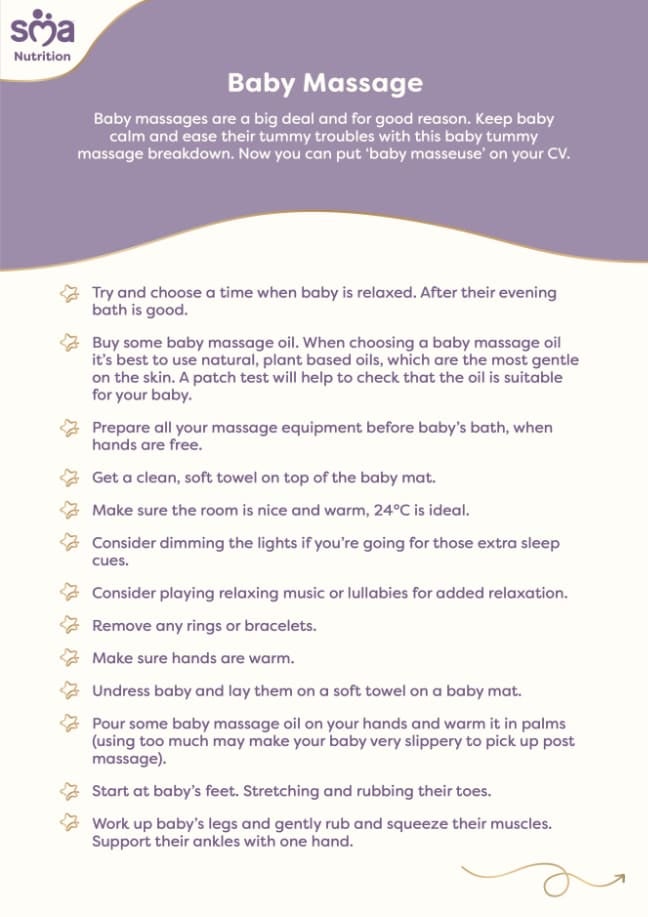Introduction
Watching your baby struggle to poo can be upsetting. Just like adults, babies can experience constipation, which can leave them feeling irritable and uncomfortable, which is tough to watch as parents. Try not to worry as baby constipation is relatively common and is usually easily managed. This article covers how often a baby should poo, what baby constipation is, signs to look out for and how to help baby constipation.
How often should a newborn poo?
When it comes to pooing habits, no two babies are the same. You’ll soon get into the rhythm of your baby’s bowel movements. Familiarising yourself with their pooing habits means that that you can spot any changes to their own pooing pattern.
- Each baby is different, but you can probably expect two to four poos a day in the first few weeks1,2.
- A breastfed baby may poo at each feed in the early weeks, then after about 6 weeks they may poo less frequently. This is completely normal1,3.
- Formula-fed babies, in general, don’t poo as often, so there’s no need to worry if it’s been a few days4. Their poo appears slightly thicker than breast-fed babies, which is completely normal4.
- If you have recently changed your baby’s formula this can cause a change in your baby’s poo. This is quite normal as your baby’s digestion system adapts to the new formula. Any changes to your baby’s poo will usually settle down within 1-2 weeks.
Some babies may even go longer between poos without being constipated. If their poos are soft, they’re producing plenty of wet nappies and they’re not distressed, your baby isn’t constipated.
What should baby poo look like?
In the first few days after your baby is born, you may notice thick, dark green or black poos. This is completely normal as newborn poo is made up of meconium (the cells and fluid from the amniotic fluid)1.
After the meconium has passed, poos become softer and turn yellow in colour, much like the appearance of wholegrain mustard!2
It can feel like an endless conveyer belt of dirty nappies in those first few weeks, but you’ll quickly learn what your baby’s normal poo habits are. Read our article on baby poo to find out more.
What is constipation in babies?
If your baby is pooing less than 3 times a week and has poos which are either large and difficult to pass, or are small, hard, and pellet-like, they may be constipated5.
What are the symptoms of constipation in babies?
Other signs and symptoms of baby constipation include:
- Signs of discomfort, irritability and excessive straining when passing a poo. Lots of babies show signs of straining when passing a poo (cue the pooing face) – if a soft poo is passed, there’s nothing to worry about5.
- A tummy which is firm or hard to press5.
- Smellier wind or poos than usual3.
- Lack of interest in feeding or a reduced appetite (as they’ll have less room in their tummy for food)6.
What causes constipation in babies?
Dehydration
If your baby isn’t drinking enough, it can make their poo more difficult to pass4.
Diet changes
If your little one switches from breast milk to formula or starts on solid foods, their tummy may take some time to adjust3,7.
Food allergy or intolerance
Constipation can sometimes be a symptom of a food allergy or intolerance8. This is relatively uncommon, affecting just 2-8% of babies under one year of age9. As always, it’s best to talk to your GP, health visitor, midwife, or public health nurse if you’re concerned8.
Low fibre intake
When your little one start on solids, make sure they’re eating a varied diet which includes plenty of fibre-containing foods such as fruits, vegetables, and cereals. Fibre helps to keep your little ones regular6. Too much fibre can cause your baby to become full quite quickly and could mean they miss out on other important nutrients. It is important to gradually build fibre into their diet and balance with other nutrients.
A reaction to a certain formula
Formula-fed babies, in general, don’t poo as often, so there’s no need to worry if it’s been a few days. Talk to your GP if you’re concerned as they may recommend trying a different kind of formula. Specific hydrolysed formulas contain protein that is broken down into smaller pieces, so are easier for babies to digest.
How to help baby constipation?
Hopefully it will pass (literally) with time. If you’re concerned that your baby is constipated, there are plenty of things you can try to relieve baby constipation.
Make sure they’re drinking enough
If you’re breastfeeding, continue to offer lots of feeds6. If your little one is formula-fed, try offering them sips of cooled, boiled tap water between their feeds, particularly if it’s hot weather10. For babies who have started weaning, offer sips of water from a free-flow cup at the end of your baby’s meals10.
Ensure you’re using the right amount of infant formula powder
If you’re formula feeding, make sure you’re using the right amount of powder. Using too much powder can reduce the amount of water your baby drinks which can cause constipation. Always follow the manufacturers guidance to preparing formula4.
Offer some fruit
If your baby has started weaning you can offer certain foods to help baby constipation. Fruits like plums, prunes, and pears are good options11. Why not try blending these fruits and adding them to your baby’s breakfast porridge? It will introduce your baby to new flavours and help keep those poos moving.
Include some fibre-rich foods
Once your baby has started on solids, offer them a varied diet which includes plenty of fibre-containing foods such as fruits, vegetables, and cereals5. This helps to promote healthy eating habits when your little one gets older and reduces their risk of constipation12.
Keep those legs moving
Just like adults, your baby’s tummy will benefit from movement. When your baby is lying flat, gently move their legs in bicycle motion3.
Try gentle tummy massage for constipation
Rub their tummy in clockwise hand movements and slow downward strokes just below their belly button. Download our baby massage checklist to help sooth your baby.
When to call your doctor or seek medical advice?
If you’re worried about your baby, you should contact your health visitor, GP, or public health nurse, especially if5:
- Your baby's constipation started from birth or within their first few weeks of life.
- Your baby has not passed their meconium within 48 hours after birth.
- Your baby isn’t improving
- Your baby has blood in their poo
- Your baby has other symptoms such as vomiting, weight loss or tiredness
Next steps
Whilst constipation is common in newborn babies, it’s important for parents to spot the signs of constipation and know when to seek help. There are lots of things you can try to relieve baby constipation so that your little one can get back to their usual, happy self. Remember that baby constipation will often improve after making a few simple changes. However, if your little one’s symptoms don’t improve talk to your GP, health visitor or public health nurse.

Midwife Live Chat
We have partnered with Epical Global giving our SMA® Baby Club members instant access to a team of expert midwives, ready to answer all your questions. The midwife team are on hand via live chat Monday to Friday, 10am – 8pm.
Feeding issues symptom checker
Experiencing feeding issues with your newborn?
Get help narrowing down the cause with our symptom checker.















